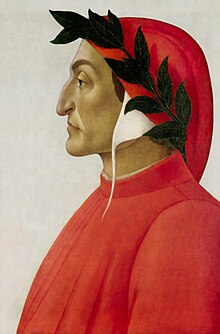
Dante Alighieri
Italian poet, writer, and philosopher (1265–1321) / From Wikipedia, the free encyclopedia
Dear Wikiwand AI, let's keep it short by simply answering these key questions:
Can you list the top facts and stats about Dante Alighieri?
Summarize this article for a 10 year old
Dante Alighieri (Italian: [ˈdante aliˈɡjɛːri]; c. May 1265 – September 14, 1321), most likely baptized Durante di Alighiero degli Alighieri[note 1] and widely known and often referred to in English mononymously as Dante (English: /ˈdɑːnteɪ, ˈdænteɪ, ˈdænti/,[3][4] US: /ˈdɑːnti/[5]), was an Italian[lower-alpha 1] poet, writer, and philosopher.[7] His Divine Comedy, originally called Comedìa (modern Italian: Commedia) and later christened Divina by Giovanni Boccaccio,[8] is widely considered one of the most important poems of the Middle Ages and the greatest literary work in the Italian language.[9][10]
Dante Alighieri | |
|---|---|
 | |
| Born | c. May 1265[1] Florence, Republic of Florence |
| Died | (1321-09-14)September 14, 1321 (aged c. 56) Ravenna, Papal States |
| Resting place | Tomb of Dante |
| Occupation | Statesman, poet, language theorist, political theorist |
| Language | Italian Tuscan Latin |
| Nationality | Florentine |
| Period | Late Middle Ages |
| Literary movement | Dolce Stil Novo |
| Notable works | Divine Comedy |
| Spouse | Gemma Donati |
| Children | 4, including Jacopo |
| Parents | Alighiero di Bellincione (father) Bella (mother) |
Dante is known for establishing the use of the vernacular in literature at a time when most poetry was written in Latin, which was accessible only to educated readers. His De vulgari eloquentia (On Eloquence in the Vernacular) was one of the first scholarly defenses of the vernacular. His use of the Florentine dialect for works such as The New Life (1295) and Divine Comedy helped establish the modern-day standardized Italian language. By writing his poem in the Italian vernacular rather than in Latin, Dante influenced the course of literary development, making Italian the literary language in western Europe for several centuries.[11] His work set a precedent that important Italian writers such as Petrarch and Boccaccio would later follow.
Dante was instrumental in establishing the literature of Italy, and is considered to be among the country's national poets and the Western world's greatest literary icons.[12] His depictions of Hell, Purgatory, and Heaven provided inspiration for the larger body of Western art and literature.[13][14] He influenced English writers such as Geoffrey Chaucer, John Milton, and Alfred Tennyson, among many others. In addition, the first use of the interlocking three-line rhyme scheme, or the terza rima, is attributed to him. He is described as the "father" of the Italian language,[15] and in Italy he is often referred to as il Sommo Poeta ("the Supreme Poet"). Dante, Petrarch, and Boccaccio are also called the tre corone ("three crowns") of Italian literature.